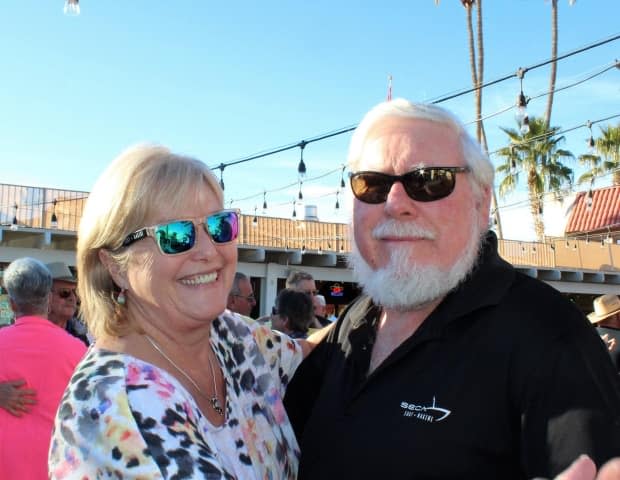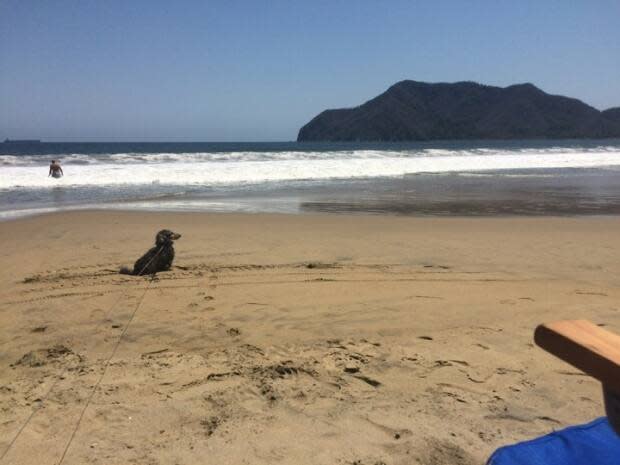B.C. snowbirds frustrated over another U.S. land border closure extension

Canadian snowbirds will have to wait at least another month before they can drive across the border to the U.S.
On Sept. 20, U.S. President Joe Biden announced that land borders will remain closed to non-essential visitors, until at least October 21. Though the closure has been ongoing for 18 months — since March 2020 — the ban doesn't apply to air travel.
"Absolute frustration is what it is. The biggest problem for snowbirds is not understanding why you can fly but you can't drive," said 73-year-old Wendy Caban.
For more than a decade, Caban and her husband, Geoff have driven to their property in Mesa, Arizona, for the winter. The retired couple usually stays in the U.S. for six months.
Caban said although they were not able to travel to Arizona last year due to the pandemic, they are still paying mobile home park fees.

"It works out to be about $12,000 Cdn that was wasted last year," said Caban. "A lot of people sold their places down there, because they weren't willing to suck up the park fees again this year."
In addition to worrying about their property, Caban said, they also have to figure out how they will get their U.S. vehicle back to Arizona.
"We drove it to B.C. at the beginning of the pandemic. It's been sitting in our garage ever since," said Caban.
It's a frustration shared by snowbirds across B.C.
Kelowna residents, David and Brenda Mowbray say they prefer driving to their property in Arizona.

"The reason we need to drive is because we want to take tools and other things to do maintenance to our property and we have a small dog we want to bring with us," said 79-year-old David Mowbray.
The challenge of flying with animals is one reason Camilla Labine and her husband Ed, who live in Vernon, said they need to be able to drive to their house in Mexico.
"We have two dogs. Last year airlines weren't even allowing pets as cargo, so we had hoped we could drive this year and avoid the hassle," said Labine.

Labine said they travel every year because her husband has cold-induced asthma.
"We just can't live here in the winter. It's too cold, and my husband gets very, very sick."
Labine said it's important for them to go to Mexico every year to check on the state of their property following hurricane season. And if they were to fly down and rent a car, it would be very challenging.
"Car rental companies have sold off all their fleets. There are no cars to rent. If you are lucky to get one, it will be very expensive, " said Labine.

Evan Rachkovsky with the Canadian Snowbird Association, a not-for-profit organization that advocates for the rights and privileges of Canadian travellers, said snowbirds would not have the added stress of renting a car if they were able to drive their own vehicles.
More than one-million Canadians make the trek down south every year and "70 per cent of snowbirds travel with their vehicles," he said.
Rachkovsky said the majority of snowbirds he's spoken to say they feel safer driving across the border than travelling through an airport during a pandemic.
He added that with the land border closure being extended, more snowbirds are looking for 'loopholes' — including flying across and shipping their RVs or vehicles.
"I've heard some snowbirds are considering shipping their RVs down there, but that is a costly option for them to exercise," he said.
Jayde McElroy, vice president of Bidbuy Importers, a company that ships commercial vehicle imports, said he was flooded with inquiries when the border closure extension was announced on Monday.

"We got about 1,000 inquiries from people asking to transport their vehicles or RVs across the border for six months. It's unfortunate they cannot drive their own vehicles, but we are happy to help," said McElroy.
Rachkovsky said the Canadian Snowbird Association has been working closely with U.S. officials to get the land border reopened as soon as possible. He said it does not make sense that people can fly, but not drive, to the U.S.
He added that having more snowbirds in the U.S. would benefit the economy.
"I don't think the U.S. government realizes what they're doing to thousands of Canadians who support their businesses. We feel really sorry for the businesses across the border that are so used to having hundreds of people every weekend, go spend money," said Brenda Mowbray from Kelowna.
Rachkovsky said many snowbirds live in their RVs full time, and spend money in smaller U.S. communities along their travels.
"Some snowbirds live in their RV for six months in Canada, and six months in the U.S. Those people are especially hard hit by the land border closures. A lot of the RV parks in Canada close in October to November, so they will have nowhere to stay. They are really reliant on the land border being open."

 Yahoo Finance
Yahoo Finance 